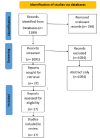Herd Immunity to Fight Against COVID-19: A Narrative Review
- PMID: 36779140
- PMCID: PMC9909126
- DOI: 10.7759/cureus.33575
Herd Immunity to Fight Against COVID-19: A Narrative Review
Abstract
The advent of severe acute respiratory syndrome coronavirus 2 (SARS-CoV-2) and its consequent illness, coronavirus disease 2019 (COVID-19), has revealed the severe impact of new, contagious pathogens on the population throughout the globe. Here, we describe the fundamental notions of herd immunity and discuss their consequences from the perspective of COVID-19, along with the obstacles to acquiring herd immunity. SARS-CoV-2 causes COVID-19, a contagious respiratory infection. It is a major global health issue, with more than 179 million positive cases and 3.8 million deaths globally. It has impacted more than 159 countries; hence, the World Health Organization designated it a pandemic. Different vaccines have been developed against coronavirus to slow the spread of this deadly virus. Immunizing people against coronavirus is the key to getting through this infectious virus. The central concept of this review article is the effect of vaccinating a large population to achieve herd immunity and the reasons for the delay in developing herd immunity. Herd immunity can prove highly beneficial for dealing with reinfection. Moreover, it can reduce the severity of the reinfection in many people who are twice infected with COVID-19. Herd immunity can prevent people in the high-risk group such as immunocompromised individuals; those on immunosuppressants; organ transplant recipients; particular age groups such as neonates, infants, toddlers, and elderly; those with impaired immunity; those with anaphylaxis reactions; and people with chronic diseases. However, due to repeated mutations of the virus, it is evolving into new strains with more severity. Its consequences on the immune system and response to a vaccine are still a big challenge to overcome. How new variants of COVID-19 impacted herd immunity needs to be investigated. The duration required for the development of herd immunity and how long it would last is still under research, along with the number of doses needed, booster doses, and the proportion of the population to be vaccinated.
Keywords: coronavirus; covid-19; herd immunity; immunocompromised; mutation; reinfection; vaccine.
Copyright © 2023, Suryawanshi et al.
Conflict of interest statement
The authors have declared that no competing interests exist.
Figures
Similar articles
-
Insights into COVID-19 Vaccine Development Based on Immunogenic Structural Proteins of SARS-CoV-2, Host Immune Responses, and Herd Immunity.Cells. 2021 Oct 29;10(11):2949. doi: 10.3390/cells10112949. Cells. 2021. PMID: 34831172 Free PMC article. Review.
-
Impact of Microbiota: A Paradigm for Evolving Herd Immunity against Viral Diseases.Viruses. 2020 Oct 10;12(10):1150. doi: 10.3390/v12101150. Viruses. 2020. PMID: 33050511 Free PMC article. Review.
-
Challenges of vaccination and herd immunity in COVID-19 and management strategies.Clin Respir J. 2022 Nov;16(11):708-716. doi: 10.1111/crj.13543. Epub 2022 Sep 29. Clin Respir J. 2022. PMID: 36172975 Free PMC article. Review.
-
The British variant of the new coronavirus-19 (Sars-Cov-2) should not create a vaccine problem.J Biol Regul Homeost Agents. 2021 Jan-Feb;35(1):1-4. doi: 10.23812/21-3-E. J Biol Regul Homeost Agents. 2021. PMID: 33377359
-
Can Africa achieve herd immunity?Glob Health Res Policy. 2021 Dec 2;6(1):46. doi: 10.1186/s41256-021-00231-1. Glob Health Res Policy. 2021. PMID: 34852844 Free PMC article. Review.
Cited by
-
Uncovering SARS-CoV-2 Molecular Epidemiology Across the Pandemic Transition: Insights into Transmission in Clinical and Environmental Samples.Viruses. 2025 May 19;17(5):726. doi: 10.3390/v17050726. Viruses. 2025. PMID: 40431737 Free PMC article.
-
Development and validation of a questionnaire to measure COVID-19 vaccine hesitancy within the Romanian industrial laborers.Front Public Health. 2025 Feb 27;13:1482778. doi: 10.3389/fpubh.2025.1482778. eCollection 2025. Front Public Health. 2025. PMID: 40084211 Free PMC article.
-
Enhancing Immunological Memory: Unveiling Booster Doses to Bolster Vaccine Efficacy Against Evolving SARS-CoV-2 Mutant Variants.Curr Microbiol. 2024 Feb 5;81(3):91. doi: 10.1007/s00284-023-03597-2. Curr Microbiol. 2024. PMID: 38311669 Review.
-
The Effect of Naturally Acquired Immunity on Mortality Predictors: A Focus on Individuals with New Coronavirus.Biomedicines. 2025 Mar 27;13(4):803. doi: 10.3390/biomedicines13040803. Biomedicines. 2025. PMID: 40299374 Free PMC article.
-
Following Natural Autoantibodies: Further Immunoserological Evidence Regarding Their Silent Plasticity and Engagement in Immune Activation.Int J Mol Sci. 2023 Oct 6;24(19):14961. doi: 10.3390/ijms241914961. Int J Mol Sci. 2023. PMID: 37834409 Free PMC article.
References
-
- The coronavirus disease 2019 (COVID-19) pandemic. Baloch S, Baloch MA, Zheng T, Pei X. Tohoku J Exp Med. 2020;250:271–278. - PubMed
Publication types
LinkOut - more resources
Full Text Sources
Miscellaneous

